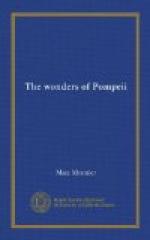I have done no more here than merely to sketch the plan of the house. Would you refurnish it? Then, rifle the Naples museum, which has despoiled it. You will find enough of bedsteads, in the collection of bronzes there, for the cubicula; enough of carved benches, tables, stands, and precious vases for the oecus, the exedra, and the wings, and enough of lamps to hang up; enough of candelabra to place in the saloons. Stretch carpets over the costly mosaic pavements and even over the simple opus signinum (a mixture of lime and crushed brick) which covered the floor of the unpretending chambers with a solid incrustation. Above all, replace the ceilings and the roofs, and then the doors and draperies; in fine, revive upon all these walls—the humblest as well as the most splendid—the bright and vivid pictures now effaced. What light, and what a gay impression! How all these clear, bold colors gleam out in the sunshine, which descends in floods from an open sky into the peristyle and the atrium! But that is not all: you must conjure up the dead. Arise, then, and obey our call, O young Pompeians of the first century! I summon Pansa, Paratus, their wives, their children, their slaves; the ostiarius, who kept the door; the atriensis, who controlled the atrium; the scoparius, armed with his birch-broom; the cubicularii, who were the bedroom servants; the pedagogue, my colleague, who was a slave like the rest, although he was absolute master of the library, where he alone, perhaps, understood the secrets of the papyri it contained. I hasten to the kitchen: I want to see it as it was in the ancient day,—the carnarium, provided with pegs and nails for the fresh provisions, is suspended to the ceiling; the cooking ranges are garnished with chased stew-pans and coppers, and large bronze pails, with luxurious handles, are ranged along on the floor; the walls are covered with shining utensils, long-handled spoons bent in the shape of a swan’s neck and head, skillets and frying-pans, the spit and its iron stand, gridirons, pastry-moulds (patty-pans?) fish-moulds (formella), and what is no less curious, the apalare and the trua, flat spoons pierced with holes either to fry eggs or to beat up liquids, and, in fine, the funnels, the sieves, the strainers, the colum vinarium, which they covered with snow and then poured their wine over it, so that the latter dropped freshened and cooled into the cups below,—all rare and precious relics preserved by Vesuvius, and showing in what odd corners elegance nestled, as Moliere would have said, among the Romans of the olden times.
[Illustration: KITCHEN UTENSILS FOUND AT POMPEII]




